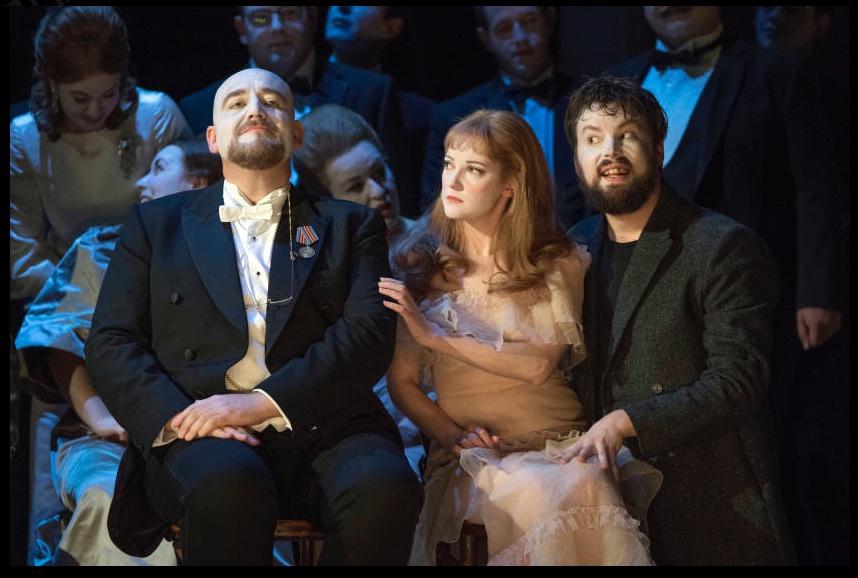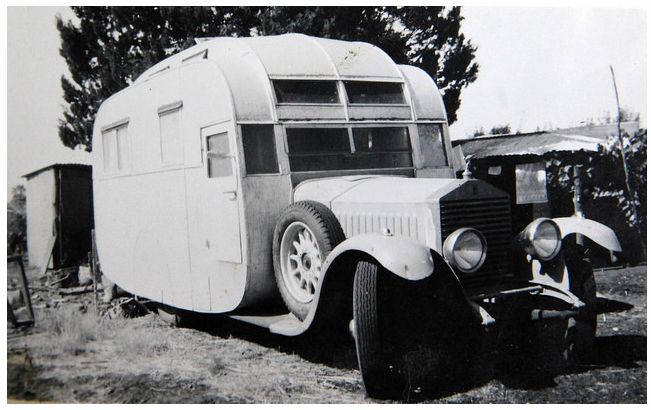Polonius, Ophelia and Hamlet – photo ©Glyndebourne
In the golden age of opera it was a common practice to base a new opera on an older play. The over-riding requirement for a very dramatic story undoubtedly encourages this process.
Most of the plays that our most popular operas are based on are now forgotten, or have been completely eclipsed by the opera. In this context it is not unprecedented for a company and composer to base a brand new opera on a familiar drama, but it is a very brave move indeed to pick the source of one of the most famous and regularly performed plays in the English language. Shakespeare’s Hamlet is so familiar that a great number of phrases have passed into common usage, from ‘Alas, poor Yorick’ to ‘get thee to a nunnery’ and the most familiar ‘to be – or not to be’.
Glyndebourne has a well deserved reputation for staging works of great quality and opulence, and has become a rallying point for the English middle classes, so perhaps bravery is not what we would expect – why take a risk when you have such a loyal and large audience?
In this context I was intrigued to see how the Friday evening performance of Hamlet at Norwich Theatre Royal would work. Having seen the same company’s classical rendition of Così Fan Tutte and riotously enjoyable Barber of Seville earlier in the week I had high hopes for Hamlet.
At first, I must admit I struggled. This bold production has many innovations. There is some interesting mixing of the backstage with the dramatic action, and the choir are amongst us, with seats in the stalls. The costumes seem to mimic those who attend Glyndebourne. The music is contemporary, using electronic as well as instrumental performance. For the first few minutes the sheer volume of noise made it hard for me to concentrate on the plot and action. I admit to thinking ‘why can’t he just speak that great line instead of singing it’. The use of Shakespeare’s timeless and very familiar verse reinforces this discomfort. I can only think of a vehicle analogy: if I was building a campervan would I start by chopping up a Rolls Royce car?
Slowly, however, this show began to work its magic on me. The initial scene in the constrained royal court setting is reinforced by the set design and stage layout of a formal celebration, against which a distressed Hamlet has to cope with the death of his father followed too quickly by the remarriage of his mother to the dead King’s brother Claudius (Wiliam Dazeley). Hamlet’s mother Gertrude (Louise Winter) seems to struggle throughout the work between innocence and complicity. Hamlet is played with huge energy and puckish glee by David Butt Philip in a memorable performance that ultimately is the reason why I think that Glyndebourne’s gamble has paid off. His Hamlet will go onto the outstanding list, and he can sing too!
As I settle into accepting the convention of opera I start to enjoy the detail of this impressive work, directed by Neil Armfield. The music composed by Brett Dean reveals multiple layers of richness that enhance the moods of each scene, and this in itself is enhanced by the presence of the choir amongst us.
As Prince Hamlet summons the ghost of his dead father, King Hamlet, he learns from the apparition that the King was indeed murdered by Claudius and he is urged to seek vengeance. The young Hamlet now becomes increasingly eccentric in his behaviour and spurns the love of his former soul-mate Ophelia. It is fair to say that she does not take this well, and Jennifer France gives us a portrayal of an Ophelia going quite gloriously bonkers. It will never be right to mock the afflicted, but her descent into madness is a high point of this work and draws out every nuance of the Shakespeare text and more, as she borrows lines from others to reinforce her distress at Hamlet’s apparent rejection of her.
Rosencrantz and Guildenstern, former classmates of Hamlet, are tasked with trying to find the root of Hamlet’s increasingly bizarre behaviour as Claudius clearly fears that the Prince knows exactly what he has done. They are portrayed as a couple of high pitched counter-tenor twins by Rupert Enticknap and James Hall in a delightful comedic aside from the grim business of revenge that dominates the opera. Hamlet responds to their lightness with practical jokes and tomfoolery.
The two other characters drawn into Claudius’ conspiracy of regicide are Ophelia’s brother Laertes (Rupert Charlesworth) and father Polonius (Jeffrey Lloyd-Roberts). Laertes is understandably determined to kill Hamlet after The Prince unwittingly kills Polonius, who he believes to be Claudius hiding in his mother’s room.
The end of the play sees a massive confrontation between the aggrieved parties, with a planned duel with Laertes rigged against Hamlet by his increasingly nervous uncle Claudius. But this is a Shakespeare tragedy, so needless to say it all goes badly wrong. As the synopsis joyfully concludes: ‘Many deaths ensue’.
So does Hamlet work as an opera? Yes, if only because the original drama is so strong and moving. This production is worth seeing and enjoying, and is splendid in detail and execution and adds a great deal to the original. Above all it is fascinating to see the result of many clever minds blending two traditions of dramatic performance into one magnificent new work.
©Julian Swainson 2017
Listing:
Così fan tutte, Tuesday 14 November at 7.15pm and Thursday 16 November at 2pm. Il barbiere di Siviglia, Wednesday 15 November at 7.15pm and Saturday 18 November at 7.15pm. Hamlet, Friday 17 November at 7.15pm. Tickets £8-£55. Discounts for Under-18s, Schools, Groups and Savers. Please note Supertitles are not visible from Stalls seats in Rows Q-W. Buy a full-price ticket for Hamlet in Bands A-C and get £10 off the same price ticket for Cosi or Barbiere.
To book, log onto www.theatreroyalnorwich.co.uk or call the box office on 01603 630000
To book, log onto www.theatreroyalnorwich.co.uk or call the box office on 01603 630000
Read the Norwich Eye review of the Barber of Seville here: https://norwicheye.co.uk/whats-on/norwich-eye-reviews-glyndebournes-barber-of-seville/
Read the Norwich Eye review of Così fan tutte here: https://norwicheye.co.uk/whats-on/norwich-eye-reviews-cosi-fan-tutte-at-the-theatre-royal/





Recent Comments